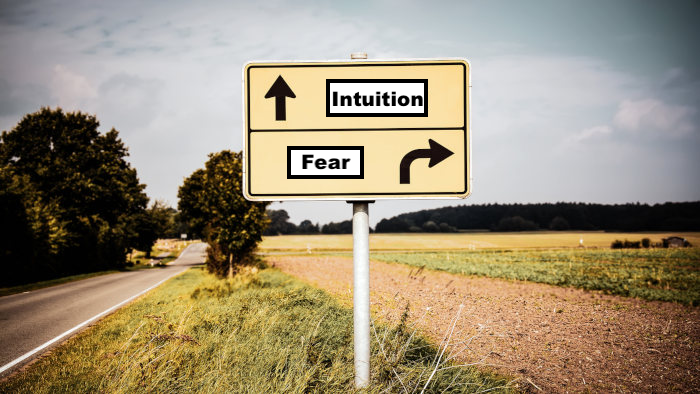October 02, 2023
Jewish Matchmaker Journal: Intuition vs. Fear in Dating

Dating can be a thrilling, yet bewildering journey. We’re high on sensations, emotions, and hormones as well as being drawn into a bit of a fantasy world where our hopes for the future and our most basic fears converge. When we meet someone we like and feel a connection with - past traumas and disappointments get triggered and suddenly, molehills can become mountains and it can be hard to distinguish between intuition and fear. When even a small decision can potentially change the course of our romance, we can struggle to know the difference between what our intuition is warning us about versus what our fears are projecting onto the situation.
When seeking a meaningful connection, it's essential to be able to decipher the signals that our inner compass is sending. Distinguishing between intuition and fear can make the difference between choosing a healthy partner who has the emotional maturity to go the distance, staying in a confusing and unhealthy relationship dynamic, or walking away from a good thing.
Understanding Intuition in Dating
Gut instinct, often called intuition, is your subconscious mind's way of processing information about a person or situation. When it comes to dating, this intuition can be a valuable guide. It's a culmination of your life experience, past relationships, and your inner wisdom, which collectively help you make informed decisions.
Recognizing Fear in Dating
Fear is an emotion that often surfaces in dating scenarios. This emotion can stem from past hurts, insecurities, or anxieties about the unknown. While fear can serve as a protective mechanism in some situations, it can also cloud our judgment and lead to rash decisions that sabotage potentially meaningful relationships.
How does one distinguish between intuition and fear? Believe it or not, there are some distinct qualities to each. If you’re trying to figure out if your fears are valid or if you are over-reacting, put your emotions to the test by considering these key features of each.
Physical sensations of intuition:
A sense of comfort and ease around the person
A natural feeling of connection
A sense of excitement and anticipation
Physical sensations of fear:
Physical discomfort, such as tension or nausea
A feeling of unease or restlessness
A desire to escape the situation or person
Timing of intuition:
Often arises gradually and consistently
Aligns with your long-term relationship goals
Encourages patience and careful consideration
Timing of fear:
Tends to emerge suddenly, triggered by insecurities or past traumas
May lead to impulsive actions or decisions to escape perceived threats
Can prioritize short-term comfort over long-term compatibility
The rationality of intuition:
Based on a logical assessment of the person's character and compatibility
Considers both short-term chemistry and long-term compatibility
Guides you toward choices that align with your values and relationship goals
The irrationality of fear:
May be rooted in irrational thoughts or irrational fears
Focuses on immediate concerns and anxieties
Can lead to avoidance behaviors or self-sabotage
The emotions of intuition:
Accompanied by positive emotions like joy, contentment, or enthusiasm
Encourages you to open up and be your authentic self
Supports the development of a healthy emotional connection
The emotions of fear:
Generates negative emotions such as anxiety, jealousy, or insecurity
Promotes guardedness and emotional walls
Hinders the development of a deep emotional bond
Self-reflection in intuition:
Promotes self-awareness and self-trust
Encourages you to embrace vulnerability and personal growth
Helps you learn from dating experiences, both positive and negative
Self-reflection in fear:
Often keeps you in your comfort zone
Hinders personal growth and learning from relationship experiences
Can lead to regrets about missed opportunities for connection
Intuitive decisions:
Lead to healthier, more fulfilling relationships
Support personal growth and self-discovery
Encourage you to pursue connections that align with your values and desires
Fear-based decisions:
Can result in missed opportunities for meaningful connections
May lead to repetitive patterns of self-sabotage in dating
Hinder personal growth and emotional well-being
Communication and Feedback
In the dating process, open communication is key. Share your fears and concerns with the person you're dating. Honest discussion can provide valuable insight into the dynamics of your relationship and help you distinguish between genuine compatibility issues and irrational fears.
Dating is an intricate dance between heart and mind, and the ability to distinguish between intuition and fear can make all the difference in your romantic journey. Trusting your gut can lead to fulfilling relationships, personal growth, and lasting love. However, it's equally important to acknowledge and address your fears when they arise, as they can impede your progress toward finding meaningful connections. Remember, dating is a process of self-discovery, and each experience, whether positive or negative, contributes to your growth and understanding of what you truly desire in a partner.

